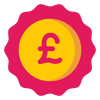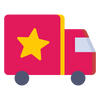Wondering when your toddler will start talking? This blog will provide you with the information and tools you need to help your child’s speech and language to develop.
We do recommend you speak to your child’s speech and language therapist if you have any concerns or questions regarding this information as our blog is only intended as a rough guide.
How does speech and language develop?
In the first 3 years of life, a child's brain undergoes intense development. They are learning how to speak and interact with others in their environment, based on sounds in their immediate environment (so watch your own language)!
It is very important to think about your child’s understanding of words when you are listening for early language. For example, a little one might begin by knowing only the most basic phrases such as “mummy" or "ball," but will quickly expand his vocabulary after hearing it frequently throughout daily life experiences like bath time! It’s very common for a toddler to understand more than they can speak. In fact, between the ages of one and two, a child can understand around five times more the number of words than they are able to say!

Your child will start to use his or her voice in more ways. They may begin by combining gestures with what they say, and vocalizing like a real person would do when speaking clearly enough for others around them: "maba," meaning “I want”; pointing at something interesting while saying 'see'. Your little one might shake their head no if you don't give them anything they desire (or maybe just playfully).
From 12 months of age, your child will start to understand a range of simple words and some questions accompanied by gestures – for example, "where's daddy?" He or she may also start anticipating common everyday activities when he/she sees certain objects.
At 18 months, your child’s understanding will develop rapidly. They will be able to follow instructions containing two key words – for example, ‘give me the spoon and the key’. They will also be able to understand some action words like ‘sit down’, ‘come here’.

It's so exciting to see your little one grow up! At this age, they will be able say ‘no’ and 'mine'. They'll use approximately 10-20 words which includes peoples' names. The next step is learning two phrases together such as "all gone," or "daddy bye-bye".
Once they reach their second birthday, you can encourage their speech and language development by introducing your child to new sounds and show them what makes the sound, for example, showing them pictures of animals and vocalising the sounds they make. Try and start categorising words that go together and encourage learning through play and turn taking.
Have fun with your child and watch them flourish!









